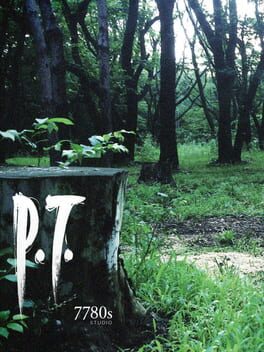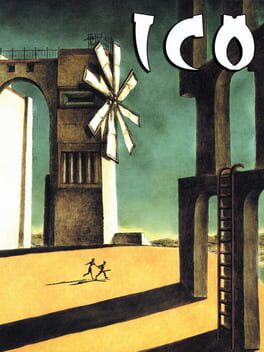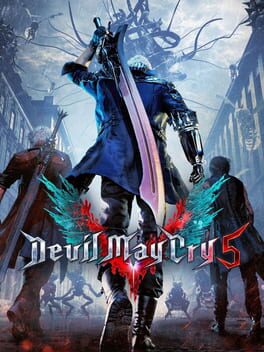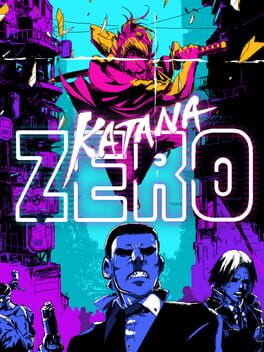sliceofzura
2005
what if you could suplex a dude carrying a chainsaw that looks like he's from a 70s slasher film, what about roundhouse kicking monsters straight from John Carpenter's horror classic "the thing", while simultaneously repositioning and adjusting yourself to drain bullets into hordes of enemies as you eventually finish off everyone you can see. but there's not a single moment of rest in this exhilaration of a game. every encounter demands you to think differently. what worked before might not work now, resident evil 4's novelty never really wears off despite some hiccups. the game's crazy nonsense keeps one upping itself, you fought a ridiculous-looking chained wolverine? how about you fight two of them at once in a tight corridor. how about you battle your way through catapults in a broody castle controlled by medieval cultists with flails and crossbows. why not face two giant golems in a lava pit pool with a giant deathtrap in the middle. no supply would be left, you really do need everything you could find. I really haven't played a game which constantly escalates the way RE4 does. it grips you on the shoulder like a sudden jolt and continues to squeeze you until the end, injecting as much adrenaline into your system as it possibly can without feeling exhausting. Mikami thought, why not force the player to adapt in every situation, every second of gameplay, let's force the player to actually think. towards the end, the freshness of its gameplay loop does wear off but it arrives just in time where the game decides to end, this is a timeless game.
I am so glad I played the PS2 version in all of its gorgeous aesthetic.
Fumito Ueda games are always an aesthetical achievement. The ability to carve emotional landscapes which feel so ethereal is stunning. The overwhelming bloom lighting and vast rolling hills and plains are incredibly immersive, the muted and washed tones of green, brown and gray envelopes the feeling of the game, as this desolate and cold world despite its blinding sheen when you trot along the flowing environment on your horse towards your next Colossi. The world of SOTC is purposely empty, meticulously designed, which further helps to push the feelings of cold illumination, intriguing mystique , two juxtaposing ideas, liminality where there exists nothing but the Colossi. You play as “Wander”, making your way to each Colossus and slowly putting an end to what little life remains including lizards which you also kill because it makes you stronger. As the player we directly contribute to Wanders’ violence even though ultimately Wander makes the decision to kill every Colossi in order to bring back Mono. At the end of the game Wander is forced to face his consequences and it ends up affecting us as the player as well, where we decay into the physical embodiment of Dormin himself, this is the result of Wanders actions on a personal level, was it really worth killing the Colossi? Their shrieking roars which we start to find empathy for. The game deliberately throws nuance to this question adding a moral facet. While the mixed emotions of the colossi and their enigmatic and curious state show that perhaps ending such a monolithic life form is not the right choice, the end of the game shows Mono alongside deers, doves, flora and fauna indicating rebirth and tenderness. Perhaps banishing Dormin tore away his aura over the forbidden lands which brought back warmth and serenity to what was an almost lifeless domain. SOTC is not only about the consequences of your violent actions and the idea of futility but also accepting what can’t be changed.
Fumito Ueda games are always an aesthetical achievement. The ability to carve emotional landscapes which feel so ethereal is stunning. The overwhelming bloom lighting and vast rolling hills and plains are incredibly immersive, the muted and washed tones of green, brown and gray envelopes the feeling of the game, as this desolate and cold world despite its blinding sheen when you trot along the flowing environment on your horse towards your next Colossi. The world of SOTC is purposely empty, meticulously designed, which further helps to push the feelings of cold illumination, intriguing mystique , two juxtaposing ideas, liminality where there exists nothing but the Colossi. You play as “Wander”, making your way to each Colossus and slowly putting an end to what little life remains including lizards which you also kill because it makes you stronger. As the player we directly contribute to Wanders’ violence even though ultimately Wander makes the decision to kill every Colossi in order to bring back Mono. At the end of the game Wander is forced to face his consequences and it ends up affecting us as the player as well, where we decay into the physical embodiment of Dormin himself, this is the result of Wanders actions on a personal level, was it really worth killing the Colossi? Their shrieking roars which we start to find empathy for. The game deliberately throws nuance to this question adding a moral facet. While the mixed emotions of the colossi and their enigmatic and curious state show that perhaps ending such a monolithic life form is not the right choice, the end of the game shows Mono alongside deers, doves, flora and fauna indicating rebirth and tenderness. Perhaps banishing Dormin tore away his aura over the forbidden lands which brought back warmth and serenity to what was an almost lifeless domain. SOTC is not only about the consequences of your violent actions and the idea of futility but also accepting what can’t be changed.
2014
Hallway after hallway, the inflicting nausea never fades away. You enter into loops upon loops, the repetitive use of a single hallway is able to instill a state of paranoia, a throbbing headache which will not leave. The slow but steady descent haunts you as you try to make sense of what events have occurred or are occurring but never arrive on a concrete conclusion. Every step you take is one of fear, you never know what can or will happen next, a cycle of fear which never stops. Its use of visual imagery such as dangling fridges,scattered miscellaneous items, and radio messages creates a masterclass of immersion and horror which exceedingly few games manage to perform. Every new loop is simultaneously a sigh of relief and an impending feeling of doom as you force yourself to face the “same” hallway. Every stylistic choice presented is to mess with your brain, leave you with more questions. It feels so meticulously designed.
Breath of the Wild manages to create this picturesque, childlike whimsical world which often feels tender and serene. The feeling of trotting along the sprawling green plains of Hyrule on your horse as you just barely avoid an enemy chasing you, the melancholic piano notes that play after are sublime. These, for me, are the best moments in the game. The pseudo random encounters, though not many, helped create much of my love for the game. Unfortunately there is way too much time spent going through the repetitive and an almost monotonous gameplay loop. Far too many stretches of area in the game feel rather empty as you walk your way along from one region to another. The lack of intricate and explorable dungeons is disappointing, there were moments where I expected to explore a decrepit castle or fortress only to be let down by a single line of broken blocks with pretty much nothing to do. The only example I encountered was Hyrule castle, which admittedly, is well designed and enjoyable. But that is one example across 40 hours.
The gameplay started off intriguing as there was a lot to mess around with using the Sheikah slate but that slowly became redundant as only your normal high attack weapons work, what becomes frustrating is your weapons constantly breaking until you get the master sword. After that you swing your sword and carve your way through almost every enemy. I really loved some of my earlier moments in which I experimented with the time stop or the magnet or the items the game presents you with. The shrines aren’t particularly interesting either as most are too easy and linear, divine beasts were good in comparison but are visually bland, feature mediocre bosses, and are the only 4 instances of dungeon type levels where I had some levels of enjoyment apart from Hyrule castle.
It’s a shame that the game slowly degraded into boring repetition where I eventually couldn’t care about playing the game anymore, the champions are one dimensional stereotypes with nothing interesting about them and no major character really piqued my interest. The combat becomes trivial as flurry rush timing is too forgiving and as I’ve already mentioned the Sheikah slate isn’t as utilized as it should’ve been. Bosses and enemies lack any variety and challenge apart from the first time you encounter the Lynel, and guardians as well as maybe Ganon.
It is easy to overlook everything I’ve said in favor of the tidbit moments of discovery and enjoyable exploration of items and gorgeous looking areas but the shortcomings hampered the experience for me. Any sense of restriction or challenge is almost non existent by the end of the game. Here is to hoping Tears of the Kingdom is a better game.
The gameplay started off intriguing as there was a lot to mess around with using the Sheikah slate but that slowly became redundant as only your normal high attack weapons work, what becomes frustrating is your weapons constantly breaking until you get the master sword. After that you swing your sword and carve your way through almost every enemy. I really loved some of my earlier moments in which I experimented with the time stop or the magnet or the items the game presents you with. The shrines aren’t particularly interesting either as most are too easy and linear, divine beasts were good in comparison but are visually bland, feature mediocre bosses, and are the only 4 instances of dungeon type levels where I had some levels of enjoyment apart from Hyrule castle.
It’s a shame that the game slowly degraded into boring repetition where I eventually couldn’t care about playing the game anymore, the champions are one dimensional stereotypes with nothing interesting about them and no major character really piqued my interest. The combat becomes trivial as flurry rush timing is too forgiving and as I’ve already mentioned the Sheikah slate isn’t as utilized as it should’ve been. Bosses and enemies lack any variety and challenge apart from the first time you encounter the Lynel, and guardians as well as maybe Ganon.
It is easy to overlook everything I’ve said in favor of the tidbit moments of discovery and enjoyable exploration of items and gorgeous looking areas but the shortcomings hampered the experience for me. Any sense of restriction or challenge is almost non existent by the end of the game. Here is to hoping Tears of the Kingdom is a better game.
1999
terrifying in every sense, I'm surprised by how suffocating this game feels. going from silent hill 2 to this game you feel a difference, I can't quite articulate it but you feel oppressed. the game is shrouded in an almost industrial grime aesthetic, and it works wonders. the camera angles all allude to Harry being restricted, even the controls help in making us feel worthless in this town. It's that fear of what's around the corner in an almost ethereal yet grimy atmosphere which keeps you invested. each level feels like its own as you navigate your way through dense, webs of halls and rooms while not feeling frustrating. the game gives you the illusion of non-linearity which helps make the world of silent hill feel so alive despite their being almost no heaps of lore texts and dialogue, it all feels so meticulously planned. mechanically the game is also impressive, enemies are quite responsive and the tension they add is immaculate. one of my favorite aspects of the gameplay is how you are able to stealth past enemies and even distract them to a certain extent. I've had moments where I was able to shoot once and lure in enemies while I slowly walk away with my flashlight turned on. these mechanics add interesting depth to an otherwise dated game which does show in some aspects but is dwarfed by everything else that is good about this game. I was constantly entranced playing this game and its ability to pull me into its aesthetical marvelous world. I really can't talk enough about how much I love the aesthetic of this game, its dense and dream-like nature is gorgeous. I found the game to have a right balance between challenging yet doable in normal mode which I felt silent hill 2 was a wee bit too forgiving in its normal mode. resource management does play an important role and by the second half I was really struggling which forced me to adapt the sneak past enemy method even though it did fail sometimes, I appreciate it for adding another layer of tension to an already intense game. the puzzles were also interesting while not being ridiculous like some parts of silent hill 2, I did struggle with 1 puzzle significantly though and I did not like it whatsoever but that is one out of many. I do think there are a bit too many save points and reducing them would definitely help in emphasizing the feeling of desperation and fear. I do like the story in fact, I think the biggest mistake someone can make walking into this game is expecting something like Silent hill 2 when it just isn't. to me, the story felt more like a convenience for the game rather than something which the player would be greatly invested in. Lisa would definitely be my favorite character alongside Harry. I'm not going to go too in depth the story because I don't have any concrete thoughts. overall I am very pleased with the game which was a surprise. I'm constantly perplexed by how engaging the game is, its industrial aesthetic is something I will always love.
2012
My fascination with Ico started when I stumbled across its gorgeous ps2 cover for the Japan/Europe region. There was something entrancing about the emerald turquoise sky which slowly faded into the cliffs of the background. The two figures of Ico and Yorda holding each other's hands as they roam across the giant yellow plane and to the right are architectural landmarks with one brick red ladder. The gorgeous windmill centered towards the right of the cover being a main feature of attraction and the arch behind it forming a bridge leading into a single doorway. It quickly became one of favorite covers of any media as it captured something so beautiful about its environment. Moving on, I decided to try out Ico and took my time as I finished the game in about 1 month, it was one of the most intriguing video game experiences and one I am amazed by.
Ico solely focuses on the relationship between Ico and Yorda. You will find that nearly every gameplay mechanic uses its feature to develop its relationship. Fumito Ueda uses an idea called 'design by subtraction' to rigorously polish until the point where everything that remains is in purpose of serving the focus of the game. Ico focuses on its intimate relationship and Ueda showed that development can be done in the form of no dialogue, this is where video games excel the most. Ico is the story of two young characters facing immeasurable odds but through the gameplay do you start to care about Yorda, an ethereal, fragile girl whose existence was to solely exist as a vessel. When the player explores its intricate and dream-like castle, it introduces mechanics in which the game makes us care about Yorda. For example, the combat exists so our attention as a player remains on Yorda as enemies cannot kill us, the game over state is simply moved to Yorda and through this do we start to give importance to her, leaving her for too long also initiates an enemy to hurt her which subconsciously makes you care about her, or take the example of holding her hand through the dedicated r1 button to help her walk throughout the castle, where we spend more time experiencing its beauty with Yorda. Or how the game designs its save point to only work if Yorda sits down beside you on the stone bench signifying how this journey is not yours alone but also Yorda's as she is given importance.
These are a few examples of how Ico expresses the importance of Yorda and its main relationship. Ico is incredibly appealing because of its ethereal and dreamy world largely due to Ueda's visionary genius. The castle in the mist is one of the most intriguing and well thought video game areas I have ever seen. Every puzzle idea is meshed brilliantly with the castle to make it seem natural and organic. There is this lingering feeling of desolation in the castle as you exhaust every nook and cranny. The world of Ico feels grounded and surreal. Strolling through the castle gates, bridges, courtyards, halls, and large rooms has never felt so engaging with Yorda. Despite the game featuring no characters in its castle for almost all of your playthrough, it manages to suck you into this magical world where you are left in awe as to how interconnected and dense it is. It is aesthetic brilliance as to how Fueda paints his castle with one of the most poetic and dense immersive experiences. The way the characters move feels so childish and fluid, fitting the essence of their characters. The sound design is emphasized heavily precisely because Ico has no flashy combat or heaps of dialogue and lore yet it manages to engage me into its core relationship simply through interactivity. Ico gives you something that other mediums cannot and that is its interactivity with a world that is full of soul. The game closes off thematically by giving an experience filled with connection, learning to think for yourself and the simplicity of becoming human. Ico tells this all through the quintessence of the video game medium, which is why this game spoke more to me than games with heaps of dialogue. Ico is the work of a single idea hammered in through every element of the game. The game is underwhelming if you look at it through the manner of dialogue and cutscenes however it speaks to you a lot more when looked at using the medium of video games.
Ico solely focuses on the relationship between Ico and Yorda. You will find that nearly every gameplay mechanic uses its feature to develop its relationship. Fumito Ueda uses an idea called 'design by subtraction' to rigorously polish until the point where everything that remains is in purpose of serving the focus of the game. Ico focuses on its intimate relationship and Ueda showed that development can be done in the form of no dialogue, this is where video games excel the most. Ico is the story of two young characters facing immeasurable odds but through the gameplay do you start to care about Yorda, an ethereal, fragile girl whose existence was to solely exist as a vessel. When the player explores its intricate and dream-like castle, it introduces mechanics in which the game makes us care about Yorda. For example, the combat exists so our attention as a player remains on Yorda as enemies cannot kill us, the game over state is simply moved to Yorda and through this do we start to give importance to her, leaving her for too long also initiates an enemy to hurt her which subconsciously makes you care about her, or take the example of holding her hand through the dedicated r1 button to help her walk throughout the castle, where we spend more time experiencing its beauty with Yorda. Or how the game designs its save point to only work if Yorda sits down beside you on the stone bench signifying how this journey is not yours alone but also Yorda's as she is given importance.
These are a few examples of how Ico expresses the importance of Yorda and its main relationship. Ico is incredibly appealing because of its ethereal and dreamy world largely due to Ueda's visionary genius. The castle in the mist is one of the most intriguing and well thought video game areas I have ever seen. Every puzzle idea is meshed brilliantly with the castle to make it seem natural and organic. There is this lingering feeling of desolation in the castle as you exhaust every nook and cranny. The world of Ico feels grounded and surreal. Strolling through the castle gates, bridges, courtyards, halls, and large rooms has never felt so engaging with Yorda. Despite the game featuring no characters in its castle for almost all of your playthrough, it manages to suck you into this magical world where you are left in awe as to how interconnected and dense it is. It is aesthetic brilliance as to how Fueda paints his castle with one of the most poetic and dense immersive experiences. The way the characters move feels so childish and fluid, fitting the essence of their characters. The sound design is emphasized heavily precisely because Ico has no flashy combat or heaps of dialogue and lore yet it manages to engage me into its core relationship simply through interactivity. Ico gives you something that other mediums cannot and that is its interactivity with a world that is full of soul. The game closes off thematically by giving an experience filled with connection, learning to think for yourself and the simplicity of becoming human. Ico tells this all through the quintessence of the video game medium, which is why this game spoke more to me than games with heaps of dialogue. Ico is the work of a single idea hammered in through every element of the game. The game is underwhelming if you look at it through the manner of dialogue and cutscenes however it speaks to you a lot more when looked at using the medium of video games.
2019
In my opinion, this game is the best in the franchise and my personal favorite. Everything about it just clicks to form an experience which reminds me of why I love video games. This is like the video games of video games. If I have to start somewhere, DMC5 takes the gameplay to the next damn level and ramps it up to the 1000th degree, it is utterly insane. I've not seen a game that works this smooth and feels this polished. You play with 4 different characters to have their own unique styles with each of them catering to different people. You love bombastic, raw annihilation? Play as Nero. You prefer the more skilled, and wide range of combat forms? Play as Dante, or the more simple yet powerful style of precision being Vergil. The game gives you so many options to choose from and I find it beautiful how the game lets you pull of so many cool tricks and moves. Every form of gameplay blends into one another, enemies are balanced to let you express your artistic combat on them without being overly easy. Its combat continues to evolve as you playthrough until you reach the end where you just start to play the game again because of how fun the gameplay loop is. The game feels incredibly smooth and refined with how the characters move and there is never a dull moment. The bosses have also been improved for the best in comparison to DMC4, 1, and to some extent even DMC3. Seeing how you adapt to different bosses is incredible. Vergil is easily one of my favorite boss fights and while you can certainly argue for other bosses in different games being more complex, what I love about Vergil is how amazingly he fits into the gameplay of DMC5. He is the perfect place to go all out with every skill you've learned and practiced and the moment when you pull of the most visually pleasing and stylish combo is when everything about the game just clicks. Not to mention how the game continuously pushes you to play more and more stylishly, through its dynamic music, stylish score, and one of the best gameplay combat it offers you. Son of Sparda is my favorite difficulty as I think Dante must Die is a tad too difficult for me but its still really fun. Other ideas I want to mention is the games incredible blend of realism and the more video game style from previous titles making it one of the most visually appealing games of all time. The environment is also beautifully detailed and while the game is incredibly linear its for the better as you spend more time indulging in its feverishly stylish gameplay. My complaints with previous DMC games is how it mixed annoying platforming with puzzles in a non-linear game which didn't work out for me as the combat of DMC games didn't mesh entirely well with puzzles and platforming plus the balancing and ridiculous enemy/boss issues from earlier games which prevented a higher score. I'm all in love with the gothic style of DMC1, and 3 but DMC5 is the perfect culmination of the franchise for me. You can argue for DMC3 being the best in the series but personally DMC5 takes the spot easily, it's a love letter to not only the franchise but also gaming in general which I will continue to adore for many, many years to come. I can talk so much more about the intricacies of certain bosses or comment about the story or talk about how epic the soundtrack is but for now this is it. If you read this review till the end then I hope you're time was not wasted. Thank u :)
2019
Been a couple hours since I finished this game. I think the game was fun, I loved clearing stages despite failing repeatedly, getting it right felt really satisfying and the slow-motion feature was super interesting to utilize. There's cool ways to clear the stages and isn't only limited to one which I found myself doing when I failed a stage after almost succeeding. I also appreciate the neo-noir style and soundtrack which compliment each other really well. I do feel though that the soundtrack does feel repetitive. So some of the tracks are not really that memorable, regardless they do fit the game nicely. As for the narrative, I'm not really that sold. I think the concept is there and it is engaging sometimes, some of the moments are interesting but it doesn't really go anywhere. I didn't feel all that invested into what was happening and preferred just clearing levels with its fast paced style. Only reason this game doesn't get a higher rating is because it doesn't really do anything special to me. It was fun and that's about it. I feel like the game didn't really excel at anything, it also felt very short. After finishing a game, I thought to myself "that's it?". I only liked the final boss and I wish the bosses were more interesting and didn't have only two moves (apart from the last one). Katana zero does almost everything right but nothing special. It follows a safe route in my opinion and if you found that special about it then I am happy for you!








